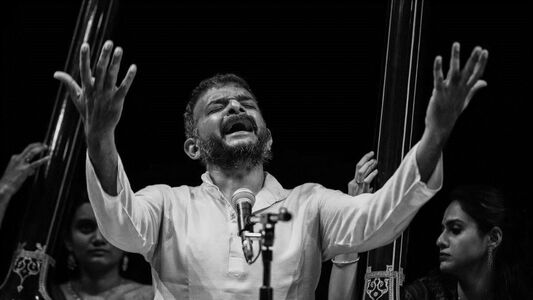I am a big fan of T M Krishna. I listen to his rendering of Carnatic Music every day and have introduced him to many, including my son, Abhishek. I love his soulful voice. Particularly, his ‘natya abhimanyu’ adding his presence and evince to his proffer.
In fact, when he performed at the Victoria Memorial in January 2020, not getting a prominent seat in the first row, I sat on the floor to absorb his performance.
In recent times, TM Krishna has made the headlines for various reasons - from music releases to his books. Earlier this month, the vocalist triggered a row after he was invited to the Chennai Music Academy to receive an honourable award at their annual festival.
Days after Chennai’s Music Academy announced that its prestigious Sangita Kalanidhi award will be given to Carnatic vocalist TM Krishna, some exponents of the classical music form have announced that they will not perform at the music festival in December at which the prize will be given.
When I was last in Bangalore and met my friend Vasantha Kalbagal, who is a Carnatic singer and shared with her my devotion to the Carnatic rendering of T M Krishna, she told me that there is a huge populace in South India who are against him, particularly his comment on M S Subbulakshmi that she has distanced herself from her Devadasi origins to gain wider acceptance.
The present outrage stems from Krishna’s expression in his music and his public statements challenging Carnatic music traditions that are rooted in caste and class privilege. I feel that the criticism stemmed from a “threat to an elite status” that Carnatic musicians enjoy.
Over the years, Krishna has been a vocal critic of the upper-caste status quo that experts say is deeply entrenched in the Carnatic music ecosystem. In 2016, when the organizers of the Ramon Magasaysay award gave Krishna the prize, they lauded his decision to “question the politics of art” and the fact that he “devoted himself to democratizing the arts as an independent artist, writer, speaker, and activist”.
At the Magsaysay award ceremony, Krishna had said that art must transcend the barriers of caste. “A precious, aesthetic experience can become part of a political and social commentary,” he said. “This, it was clear to me, was wrong, unfair – unfair to society, unfair to the art. I must, I felt, resist this near hegemony.”
When The Music Academy announced on March 17 that it was conferring the award on Krishna, it expressed appreciation for his efforts to use “music as a tool for social reform”.
Known for his powerful voice and his adherence to tradition when it comes to the art, he has experimented widely with its format. He has also worked towards expanding the listener base of the art by taking it to varied social settings and focusing on its exploratory as opposed to tightly defined structures.
It is interesting to note that even as many artists have criticised Krishna for his socio-political views, none of them have questioned his brilliance as a musician. None of the protesting musicians have mentioned TM Krishna’s artistic qualities.
Krishna in his books and talk argues that caste privilege has shaped Carnatic music and its ecosystem. From his writing and singing, it is clear that his critique comes from a place of deep love for the art form. Realising that we can critique what we love is a sign of maturity – the opposite of blind faith.
Krishna, by virtue of being awarded the Sangeeta Kalanidhi, will preside over the academic sessions and concerts of The Music Academy, scheduled to be held in a fishing village near Chennai between December 15, 2024, and January 1, 2025.
I intend to attend the festival.

